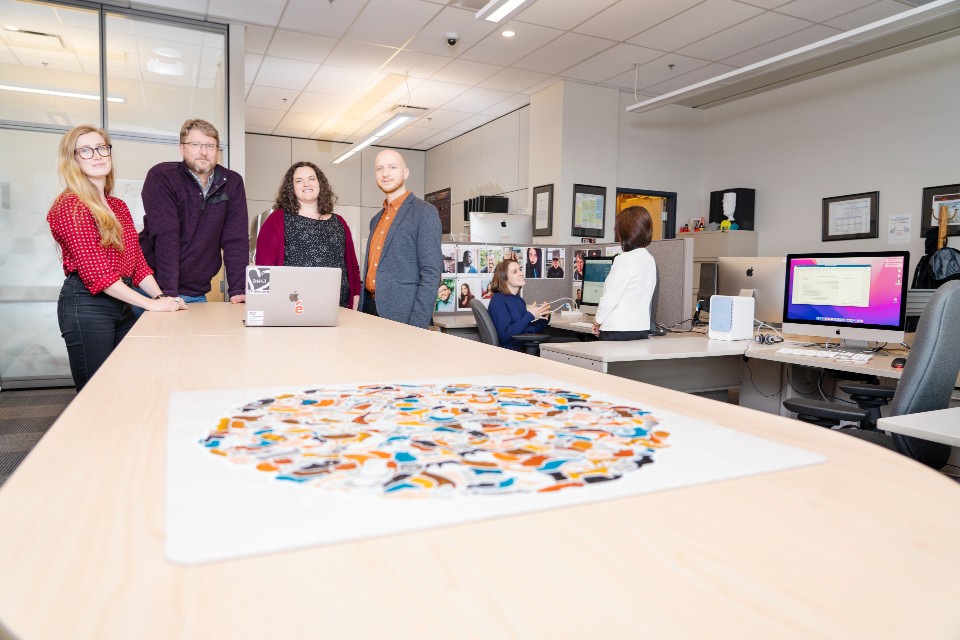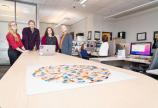Common, digital space for humanities & social science research
- Phil Cox

Before the Trans-Canada highway was completed in the 1970s, driving across Canada was possible only for a privileged few. Highways were disconnected from one another, providing no single access point or common route for the communities operating across the country’s vast terrain.
The same may also be said of Canada’s digital research infrastructure today, says Distinguished Humanities Professor Ray Siemens, which is why he and a University of Victoria-based team are leading the development of the Canadian Humanities and Social Sciences Commons—a bilingual, open source, pan-national digital network and research hub that launched in beta this spring.
With financial support from the Social Sciences and Humanities Research Council of Canada, the project connects key academic societies and organizations from across North America and Australia to support knowledge mobilization at the national level.
“A lot of Canadian research is kept behind closed doors and commercial paywalls, which is a barrier for most Canadians looking to access the information within them,” Siemens states. “We’re bringing that knowledge out into the open by building a common, digital space for Canadian humanities and social sciences research and researchers.”
This is not the metaphorical "information super-highway” of the 1990s. The Canadian HSS Commons is an online workspace, publishing platform, archival system and social network that enables scholars of all stripes to create, share and preserve knowledge, with all the features that 21st century digital technology affords.
The project is an initiative of the UVic-based Implementing New Knowledge Environments (INKE) partnership, which is coordinated by the Canadian Social Knowledge Institute—two highly collaborative hives of globallyconnected researchers that surround Siemens, who is internationally recognized as a founding figure and leader of the digital humanities.
These twin organizations are best understood through their shared mission to promote, develop, support and implement open social scholarship across the globe.
“Open social scholarship is a new term for an old idea: that knowledge is a public good and that the open flow of knowledge is crucially important for a free, democratic and informed society,” says Alyssa Arbuckle, the operational lead of the INKE partnership.
For more than a decade, the team has supported this ideal in Canada through a dizzying array of publications, presentations, policy recommendations and partnerships that put their research into practice through projects like the commons.
Although the commons’ primary user base will come from partnering institutions like the Federation for the Humanities and Social Sciences, which boasts upward of 91,000 members, the commons and the research that these scholars publish through it will be open to all Canadians, says Graham Jensen, an INKE and Mitacs postdoctoral fellow leading the commons’ launch.
“The site is designed so that anyone interested in any humanities and social sciences can create a free account and become a part of the conversation about that subject,” explains Caroline Winter, another INKE postdoctoral fellow who has worked on the project since 2018.
Once finished, the source code will be published online, free for anyone to use for their own projects and purposes, regardless of national or disciplinary boundaries—a free and open source of knowledge to connect intellectual communities across the Earth’s vast terrain.
EdgeWise
Canadian researchers have a distinct advantage in the way they can use and share research and other forms of intellectual property, particularly for collaborative and communityengaged projects. Canada’s progressive fair-use exemptions balance protections for knowledge producers with supports for the free and fair exchange of information, especially in educational contexts.
Ours is also one of the few countries in the world that purchases digital scholarship resources in bulk through a single buyer (the Canadian Research Knowledge Network, a pan-national group based in Toronto) and that connects its research libraries through a single association (the Canadian Association of Research Libraries).
Following open-access principles, and in collaboration with these groups, the Canadian Humanities and Social Sciences Commons leverages Canadian strengths and connects existing research infrastructure through a free, publicly accessible, online platform.
According to Siemens, “a pannational research Commons just makes sense in Canada. It allows for access, use, sharing and commenting on research at a national level—a real advantage for our community.”

